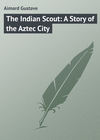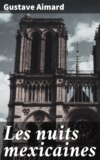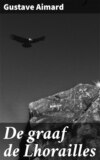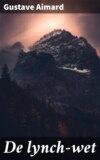Читать книгу: «The Trappers of Arkansas: or, The Loyal Heart»
PREFACE
The publication of the present volume of Gustave Aimard's works renders the series complete. It takes its place as the first of all: and it is succeeded by the "Border Rifles," "Freebooters," and "White Scalper." In exciting scenes and perilous adventures, this work, if possible, surpasses all those which have as yet been offered to the English reader. Moreover it enables the development of Aimard's literary talent to be distinctly traced. The critic will discover, that, at first, Gustave Aimard's brain so teemed with incidents, that he paid slight attention to plot, and hence this volume – as is indeed generally the case with works relative to Indian life and character – consists rather of a succession of exciting adventures than of a regularly developed drama. This fault our Author has corrected in his later works: his hand, at first better suited to wield the bowie knife than the pen, has regained its pliancy; and the ever increasing encouragement bestowed on his stories in England, is a gratifying proof that his efforts after artistic improvement have been fully appreciated.
L.W.
PROLOGUE
CHAPTER I.
HERMOSILLO
The traveller who for the first time lands in the southern provinces of America involuntarily feels an undefinable sadness.
In fact, the history of the New World is nothing but a lamentable martyrology, in which fanaticism and cupidity continually go hand in hand.
The search for gold was the origin of the discovery of the New World; that gold once found, America became for its conquerors merely a storehouse, whither greedy adventurers came, a poniard in one hand and a crucifix in the other, to gather an ample harvest of the so ardently coveted metal, after which they returned to their own countries to make a display of their riches, and provoke fresh emigrations, by the boundless luxury they indulged in.
It is to this continual displacement that must be attributed, in America, the absence of those grand monuments, the foundation stones as it were of every colony which plants itself in a new country with a view of becoming perpetuated.
If you traverse at the present day this vast continent, which, during three centuries, has been in the peaceable possession of the Spaniards, – you only meet here and there, and at long distances apart, with a few nameless ruins to attest their passage; whilst the monuments erected many ages before the discovery, by the Aztecs and the Incas, are still standing in their majestic simplicity, as an imperishable evidence of their presence in the country and of their efforts to attain civilization.
Alas! what has resulted from those glorious conquests, so envied by the whole of Europe, in which the blood of the executioner was mingled with that of the victims, to the profit of that other nation, at that time so proud of its valiant captains, of its fertile territories, and of its commerce which embraced the entire world? Time has held on his march, and Southern America is at this hour expiating the crimes of which she was the instigation. Torn by factions which contend for an ephemeral power; oppressed by ruinous oligarchies; deserted by the strangers who have fattened upon her substance, she is sinking slowly beneath the weight of her own inertia, without having the strength to lift the leaden winding sheet which stifles her, and is destined never to awaken again till the day when a new race, unstained by homicide, and governed by laws framed after those of God, shall bring to her the labour and liberty which are the life of nations.
In a word, the Hispano-American race has perpetuated itself in the domains bequeathed to it, by its ancestors, without extending their boundaries; its heroism was extinguished in the tomb of Charles V, and it has preserved nothing of the mother country but its hospitable customs, its religious intolerance, its monks, its guitarreros, and its mendicants armed with muskets.
Of all the states that form the vast Mexican confederation, that of Sonora is the only one which, by its conflicts with the Indian tribes that surround it, and a continual intercourse with these races, has preserved a distinctive physiognomy.
The manners of its inhabitants have a certain wild character, which distinguishes them, at the first glance, from those of the interior provinces.
The Rio Gila may be considered the northern limit of this state: on the east and west it is bounded by the Sierra Madre and the Gulf of California.
The Sierra Madre beyond Durango divides into two chains; the principal continues the grand direction from north to south; the other tends towards the west, running along, in the rear of the states of Durango and Guadalajara, all the regions which terminate at the Pacific. This branch of the Cordilleras forms the southern limits of Sonora.
Nature seems to have taken a delight in lavishing her benefits upon this country. The climate is clear, temperate, salubrious; gold, silver, the most fertile soil, the most delicious fruits, and medicinal herbs abound; there are to be found the most efficacious balms, insects the most useful for dyeing, the rarest marbles, the most precious stones, as well as game and fish of all sorts. But in the vast solitudes of the Rio Gila and the Sierra Madre, the independent Indians, the Comanches, Pawnees, Pimas, Opatas, and Apaches, have declared a rude war against the white race, and in their implacable and incessant incursions, make them pay dearly for the possession of all those riches of which their ancestors despoiled the natives, and which they incessantly endeavour to recover again without ceasing.
The three principal cities of the Sonora are Guaymas, Hermosillo, and Arispe.
Hermosillo, anciently Pitic, and which the expedition of the Count de Raouset Boulbon has rendered famous, is the entrepôt of the Mexican commerce of the Pacific, and numbers more than nine thousand inhabitants.
This city, built upon a plateau which sinks towards the north, in a gentle declivity to the sea, leans and shelters itself against a hill named El Cerro de la Campana (Mountain of the Bell), whose summit is crowned with enormous blocks of stone, which, when struck, render a clear metallic sound.
In other respects, like its other American sisters, this ciudad is dirty, built of pisé bricks, and presents to the astonished eyes of the traveller a mixture of ruins, negligence, and desolation which saddens the soul.
On the day in which this story commences, that is to say, the 17th January, 1817, between three and four o'clock in the afternoon, a time when the ordinary population are taking the siesta in the most retired apartments of their dwellings, the city of Hermosillo, generally so calm and quiet, presented an unusual aspect.
A vast number of leperos, gambusinos, contrabandists, and, above all, of rateros, were crowded together, with cries, menaces, and wild howlings, in the Calle del Rosario (Street of the Rosary). A few Spanish soldiers, – at that period Mexico had not shaken off the yoke of the mother country, – were endeavouring in vain to re-establish order and disperse the crowd, by striking heavily, right and left, with the shafts of their lances, all the individuals who came in their way.
But the tumult, far from diminishing, on the contrary rapidly increased; the Hiaquis Indians, in particular, mingled with the crowd, yelled and gesticulated in a truly frightful manner.
The windows of the houses were filled with the heads of men and women, who, with looks directed towards the Cerro de la Campana, from the foot of which arose thick clouds of smoke in large volumes towards the heavens, seemed to be in expectation of some extraordinary event.
All at once loud cries were heard; the crowd divided in two, like an overripe pomegranate, everyone throwing himself on one side or the other, with marks of the greatest terror; and a young man, or a boy rather, for he was scarcely sixteen, appeared, borne along like a whirlwind by the furious gallop of a half wild horse.
"Stop him!" cried some.
"Lasso him!" cried others.
"Válgame Dios!" the women murmured, crossing themselves. "It is the demon himself."
But everyone, instead of stopping him, got out of his way as quickly as he could; the bold boy continued his rapid course, with a jeering smile upon his lips, his face inflamed, his eye sparkling, and distributing, right and left, smart blows with his chicote on all who ventured too near him, or whose unfortunate destiny prevented them from getting out of his way as fast as they would have wished.
"Eh! eh! Caspita!" (said, as the boy jostled him in passing, a vaquero with a stupid countenance and athletic limbs,) "Devil take the madman, he nearly knocked me down! Eh! but," he added, after having cast a glance at the young man, "if I mistake not, that is Rafaël, my neighbour's son! Wait a moment, picaro!"
While speaking this aside between his teeth, the vaquero unrolled the lasso which he wore fastened to his belt, and set off running in the direction of the horseman.
The crowd, who understood his intention, applauded with enthusiasm.
"Bravo, bravo!" they cried.
"Don't miss him, Cornejo!" some vaqueros encouragingly shouted, clapping their hands.
Cornejo, since we know the name of this interesting personage, gained insensibly upon the boy, before whom obstacles multiplied more and more.
Warned of the perils which threatened him, by the cries of the spectators, the horseman turned his head.
Then he saw the vaquero.
A livid paleness covered his countenance; he felt that he was lost.
"Let me escape, Cornejo," he cried, choking with tears.
"No, no!" the crowd howled; "lasso him! lasso him!"
The populace took great interest in this manhunt; they feared to find themselves cheated of a spectacle which gave them much satisfaction.
"Surrender," the giant replied; "or else, I warn you, I will lasso you like a ciboto."
"I will not surrender," the boy said resolutely.
The two speakers still held on their way, the one on foot, the other on horseback.
The crowd followed, howling with pleasure. The masses are thus everywhere – barbarous and without pity.
"Leave me, I say," the boy resumed, "or I swear by the blessed souls of purgatory, that evil will befall you!"
The vaquero sneered, and whirled his lasso round his head.
"Be warned, Rafaël," he said; "for the last time, will you surrender?"
"No! a thousand times no!" the boy cried, passionately.
"By the grace of God, then!" said the vaquero.
The lasso whizzed and flew through the air.
But a strange thing happened at the same moment.
Rafaël stopped his horse short, as if it had been changed into a block of granite; and, springing from the saddle, he bounded like a tiger upon the giant, whom the shock bore down upon the sand; and before anybody could oppose him, he plunged into his throat the knife which all Mexicans wear in their belts.
A long stream of blood spouted into the face of the boy, the vaquero writhed about for a few seconds, and then remained motionless.
He was dead!
The crowd uttered a cry of horror and fear.
Quick as lightning, the boy had regained his saddle, and recommenced his desperate course, brandishing his knife, and laughing with the grin of a demon.
When, after the first moment of stupor had passed, the people turned to pursue the murderer, he had disappeared. No one could tell which way he had gone. As is generally the case under such circumstances, the juez de letras (criminal judge), accompanied by a crowd of ragged alguaciles, arrived on the spot where the murder had been committed when it was too late.
The juez de letras, Don Inigo Tormentes Albaceyte, was a man of some fifty years of age, short and stout, with an apoplectic face, who took snuff out of a gold box enriched with diamonds, and concealed under an apparent bonhomie a profound avarice backed by excessive cunning and a coolness which nothing could move.
Contrary to what might have been expected, the worthy magistrate did not appear the least in the world disconcerted by the flight of the assassin; he shook his head two or three times, cast a glance round the crowd, and winked his little grey eye, —
"Poor Cornejo!" he said, stuffing his nose philosophically with snuff: "this was sure to happen to him some day or other."
"Yes," said a lepero, "he was neatly killed!"
"That is what I was thinking," the judge replied; "he who gave this blow knew what he was about; the fellow is a practised hand."
"Humph!" the lepero replied, with a shrug of his shoulders, "he is a boy."
"Bah!" the judge said, with feigned astonishment, and casting an under-glance at the speaker; "a boy!"
"Little more," the lepero added, proud of being thus listened to; "it was Rafaël, Don Ramón's eldest son."
"Ah! ah! ah!" the judge said, with a secret satisfaction. "But no," he went on, "that is not possible; Rafaël is but sixteen at most; he would never have been so foolish as to quarrel with Cornejo, who, by only grasping his arm, could have disabled him."
"Nevertheless, it was as I tell your excellency, – we all saw it. Rafaël had been playing at monte, at Don Aguillar's, and it appears that luck was not favourable to him; he lost all the money he had; he then flew into a rage, and to avenge himself, set fire to the house."
"Caspita!" said the judge.
"It was just as I have the honour to tell your excellency; look, the smoke may yet be seen, though the house is in ashes."
"Well, it seems so," the judge said, turning his eyes to the point indicated by the lepero. "And, then – "
"Then," the other continued, "he naturally wished to escape. Cornejo endeavoured to stop him."
"He was right!"
"Well, he was wrong, I think; for Rafaël killed him!"
"That's true! that's true!" said the judge; "but be satisfied, my good people, justice will avenge him."
This promise was received by all present with a smile of doubt.
The magistrate, without concerning himself about the impression produced by his words, ordered his acolytes, who had already examined and plundered the defunct, to take the body away, and transport it to the porch of the nearest church, and then returned to his residence, rubbing his hands with a satisfied air.
The judge put on a travelling dress, placed a brace of pistols in his belt, fastened a long sword to his side, and, after taking a light dinner, went out.
Ten alguaciles, armed to the teeth, and mounted on strong horses, waited for him at the door; a domestic held the bridle of a magnificent black horse, which pawed the ground and champed the bit impatiently. Don Inigo placed himself in the saddle, headed his men, and the troop went off at a gentle trot.
"Eh! eh!" said the curious, who were stationed around upon the doorsteps. "The Juez Albaceyte is going to Don Ramón Garillas's; we shall hear some news tomorrow."
"Caspita!" others replied; "his picaro of a son has fairly earned the cord that is to hang him!"
"Humph!" said a lepero, with a smile of regret; "that would be unfortunate! the lad promises so well! By my word, the cuchillada he gave Cornejo was magnificent. The poor devil was neatly killed."
In the meantime, the judge continued his journey, returning with punctuality all the salutations with which he was overwhelmed on his way. He was soon in the country.
Then pulling his cloak tighter round him, he asked, —
"Are the arms all loaded?"
"Yes, excellency," the chief of the alguaciles replied.
"That's well. To the hacienda of Don Ramón Garillas, then; and at a smart pace; we must endeavour to get there before nightfall."
The party set off at a gallop.
CHAPTER II.
THE HACIENDA DEL MILAGRO
The environs of Hermosillo are a thorough desert. The road which leads from that city to the Hacienda del Milagro (Farm of the Miracle) is one of the dullest and most arid possible.
Nothing is to be seen but, at rare intervals, ironwood, gum, and Peru trees, with red and spicy clusters, nopales, and cactuses, the only trees that can possibly grow in a soil calcined by the incandescent rays of a perpendicular sun.
At distances are visible, as if in bitter derision, the long poles of cisterns, with a leathern bucket, twisted and shrivelled, at one extremity, and at the other stones fastened by straps; but the cisterns are dry, and the bottom of them is merely a black slimy crust, in which myriads of unclean animals disport; whirlwinds of a fine and impalpable dust, raised by the least breath of wind, choke the panting traveller, and under every blade of dried grass the grasshoppers call with fury for the beneficent night dews.
When, however, with great labour, the traveller has covered six leagues of this burning solitude, the eye reposes with delight upon a splendid oasis, which appears all at once to rise from the bosom of the sands.
This Eden is the Hacienda del Milagro.
At the time our history took place, this hacienda, one of the richest and largest in the province, was composed of a two storied house, built of tapia and adobes, with a terrace roof of reeds, covered with beaten earth.
Access to the hacienda was gained by passing through an immense court, the entrance of which shaped like an arched portico, was furnished with strong folding gates, and a postern on one side. Pour chambers completed the front; the windows had gratings of gilded iron, and shutters inside; they were glazed, an almost unheard-of luxury in that country at that time; on the four sides of the court, or patio, were the apartments for the peons and children, &c.
The ground floor of the principal house was composed of three apartments; a kind of grand vestibule furnished with antique fauteuils and canopies covered with stamped Cordovan leather, with a large nopal table and some stools; upon the walls hung, in gilded frames, several old full-length portraits, representing the members of the family; while the beams of the ceiling, left in relief, were decorated with a profusion of carvings.
Two folding doors opened into the saloon; the side in front of the patio was raised about a foot above the rest of the floor; it was covered by a carpet, and contained a row of curiously carved low stools ornamented with, crimson velvet, and cushions for the feet; there was also a little square table, eighteen inches high, serving as a work table. This portion of the saloon is reserved for the ladies, who there sit cross-legged, in the Moorish fashion; on the other side of the saloon were chairs covered with the same stuff as the stools and the cushions. Facing the entrance of the saloon was the principal bedchamber, with an alcove at the back of a daïs, upon which stood a bed of ceremony, ornamented with an infinity of gildings and brocade curtains, with tassels and fringes of gold and silver; the sheets and pillowcases were of the most beautiful linen, bordered with wide lace.
Behind the principal house was a second patio, in which were the kitchens and the corral; beyond this court was an immense garden, surrounded by walls, and more than a hundred perches in length, laid out in the English fashion, and containing the most remarkable exotic plants and trees.
It was holiday time at the hacienda.
It was the period of the matanza del ganado (slaughtering of cattle). The peons had formed, at a few paces from the hacienda, an enclosure, in which, after driving the beasts, they separated the lean from the fat, which they drove out, one by one, from the enclosure.
A vaquero, armed with a sharp instrument in the form of a crescent, furnished with points placed at the distance of a foot apart, and who was concealed behind the door of the enclosure, cut, with great address, the hamstrings of the poor beasts, as they passed before him.
If by chance he missed a stroke, which he rarely did, a second vaquero, mounted on horseback, galloped after the animal, threw the lasso round its horns, and held it till the first had succeeded in cutting its hamstrings.
Carelessly leaning against the portico of the hacienda, a man of about forty years of age, clothed in the rich costume of a gentleman farmer, his shoulders covered by a zarapé of brilliant colours, and his head protected from the rays of the setting sun by a fine hat of Panama straw, worth at least five hundred piastres, seemed to be presiding over this scene while enjoying a husk cigarette.
He was a gentleman of lofty bearing, slightly built, but perfectly well-proportioned, and his features well defined with firm and marked lines, denoted loyalty, courage, and, above all, an inflexible will. His large black eyes, shaded by thick eyebrows, displayed indescribable mildness; but when any contradictory chance spread a red glow over his embrowned complexion, his glance assumed a fixity and a force which few could support, and which made even the bravest hesitate and tremble.
His small hands and feet, and more than all, the aristocratic stamp impressed upon his person, denoted, at the first glance, that this man was of pure and noble Castilian race.
In fact, this personage was Don Ramón Garillas de Saavedra, the proprietor of the Hacienda del Milagro, which we have just described.
Don Ramón Garillas was descended from a Spanish family, the head of which had been one of the principal lieutenants of Cortez, and had settled in Mexico after the miraculous conquest of that clever adventurer.
Enjoying a princely fortune, but unnoticed by the Spanish authorities, on account of his marriage with a woman of mixed Aztec blood, he had given himself up entirely to the cultivation of his land, and the amelioration of his vast domains.
After seventeen years of marriage, he found himself the head of a large family, composed of six boys and three girls, in all nine children, of whom Rafaël – he whom we have seen so deftly kill the vaquero – was the eldest.
The marriage of Don Ramón and Doña Jesuita had been merely a marriage of convenience, contracted solely with a view to fortune, but which, notwithstanding, had rendered them comparatively happy; we say comparatively, because, as the girl only left her convent to be married, no love had ever existed between them, but its place had been almost as well occupied by a tender and sincere affection.
Doña Jesuita passed her time in the cares necessitated by her children, surrounded by her Indian women. On his side, her husband, completely absorbed by the duties of his life as a gentleman farmer, was almost always with his vaqueros, his peons, and his huntsmen, only seeing his wife for a few minutes at the hours of meals, and sometimes remaining months together absent in hunting excursions on the banks of the Rio Gila.
Nevertheless, we are bound to add that, whether absent or present, Don Ramón took the greatest care that nothing should be wanting for his wife's comfort; and in order that her least caprices might be satisfied, he spared neither money nor trouble to procure her all she appeared to desire.
Doña Jesuita was endowed with extraordinary beauty and angelic mildness; she appeared to have accepted, if not with joy, at least without any great pain, the kind of life to which her husband bad obliged her to submit; but in the depth of her large black languishing eye, in the paleness of her countenance, and, above all, in the shade of sadness which continually obscured her beautiful white brow, it was easy to divine that an ardent soul abode within that seducing statue, and that the heart, which was ignorant of itself, had turned all its feelings upon her children, whom she adored with all the virginal strength of maternal love, the most beautiful and the most holy of all loves.
As for Don Ramón, always good and anxious for his wife, whom he had never taken the pains to study, he had a right to believe her the happiest creature in the world, which, in fact, she became as soon as God made her a mother.
It was some minutes after sunset; the sky, by degrees, lost its purple tint, and grew rapidly darker; a few stars began to sparkle in the celestial vault, and the evening wind arose with a force that presaged for the night, one of those terrible storms which so often burst over these regions of the sun.
The mayoral, after having caused the rest of the ganado to be carefully shut up in the enclosure, assembled the vaqueros and the peons, and all directed their steps towards the hacienda, where the supper bell announced to them that the hour of rest was at length arrived.
As the major-domo passed the last, with a bow, before his master, the latter asked him:
"Well, Nô Eusebio, how many heads do we count this year?"
"Four hundred and fifty mi amo– my master," replied the mayoral, a tall, thin, wizened man, with a grayish head, and a countenance tanned like a piece of leather, stopping his horse and taking off his hat; "that is to say, seventy-five head more than last year. Our neighbours the jaguars and the Apaches have not done us any great damage this season."
"Thanks to you, Nô Eusebio," Don Ramón replied; "your vigilance has been great; I must find means to recompense you for it."
"My best recompense is the kind remark your lordship has just addressed to me," the mayoral, whose rough visage was lit up by a smile of satisfaction, replied. "Ought I not to watch over everything that belongs to you with the same zeal as if it were my own?"
"Thanks," the gentleman remarked with emotion, and shook his servant's hand. "I know how truly you are devoted to me.
"For life and to death, my master! My mother nourished you with her milk; I belong to you and your family."
"Come, come, Nô Eusebio," the hacendero said, gaily; "supper is ready; the señora is by this time at table; we must not keep her waiting."
Upon this, both entered the patio, and Nô Eusebio, as Don Ramón had named him, prepared, as was his custom every evening, to close the gates.
In the meantime, Don Ramón entered the dining hall of the hacienda, where all the vaqueros and peons were assembled.
This hall was furnished with an immense table, which occupied the entire centre; around this table there were wooden forms covered with leather, and two carved armchairs, intended for Don Ramón and the señora. Behind these chairs, an ivory crucifix, four feet high, hung against the wall, between two pictures, representing, the one, "Jesus in the Garden of Olives," the other the "Sermon on the Mount." Here and there, on the whitewashed walls, grinned the heads of jaguars, buffaloes, and elks, killed in the chase by the hacendero.
The table was abundantly supplied with lahua, or thick soup made of the flour of maize boiled with meat, with puchero, or olla podrida, and with pepian; at regular distances there were bottles of mezcal, and decanters of water.
At a sign from the hacendero the repast commenced.
The storm, which had threatened for some time past, now broke forth with fury.
The rain fell in torrents; at every second vivid flashes of lightning dimmed the lights of the hall, preceding awful claps of thunder.
Towards the end of the repast, the hurricane acquired such violence, that the tumult of the conspiring elements drowned the hum of conversation.
The thunder peals clashed with frightful force, a whirlwind filled the hall, after dashing in a window, and extinguished all the lights; the assembly crossed themselves with terror.
At that moment, the bell placed at the gate of the hacienda resounded with a convulsive noise, and a voice, which had nothing human in it, cried twice distinctly, —
"Help! help!"
"Sangre de Cristo!" Don Ramón cried, as he rushed out of the hall, "somebody is being murdered on the plain."
Two pistol shots resounded at almost the same moment, a cry of agony rung through the air, and all relapsed into sinister darkness.
All at once, a pale flash of lightning furrowed the obscurity, the thunder burst with a horrible crash, and Don Ramón reappeared in the hall, bearing a fainting man in his arms.
The stranger was placed in a seat, and all crowded round him.
There was nothing extraordinary in either the countenance or the appearance of this man, and yet, on perceiving him, Rafaël, the eldest son of Don Ramón, could not repress a gesture of terror, and his face became lividly pale.
"O!" he murmured, in a low voice, "it is the juez de letras!"
It was, indeed, the worthy judge, whom we saw leave Hermosillo with such a brilliant equipage.
His long hair, soaked with rain, fell upon his breast, his clothes were in disorder, spotted with blood, and torn in many places.
His right hand convulsively clasped the stock of a discharged pistol.
Don Ramón had likewise recognized the juez de letras, and had unconsciously darted a glance at his son, which the latter could not support.
Thanks to the intelligent care that was bestowed upon him by Doña Jesuita and her women, he breathed a deep sigh, opened his haggard eyes, which he rolled round upon the assembly, without at first seeing anything, and by degrees recovered his senses.
All at once a deep flush covered his brow, which had been so pale a minute before, and his eye sparkled. Directing a look towards Don Rafaël which nailed him to the floor, a prey to invincible terror, he rose painfully, and advancing towards the young man, who saw his approach without daring to seek to avoid him, he placed his hand roughly on his shoulder, and turning towards the peons, who were terrified at this strange scene, of which they comprehended nothing, he said solemnly, —
"I, Don Inigo Tormentes Albaceyte, juez de letras of the city of Hermosillo, arrest this man, accused of assassination, in the king's name!"
"Mercy!" cried Rafaël, falling on his knees, and clasping his hands with despair.
"Woe! woe!" the poor mother exclaimed, as she sank back fainting in her chair.
Покупайте книги и получайте бонусы в Литрес, Читай-городе и Буквоеде.
Участвовать в бонусной программе




















